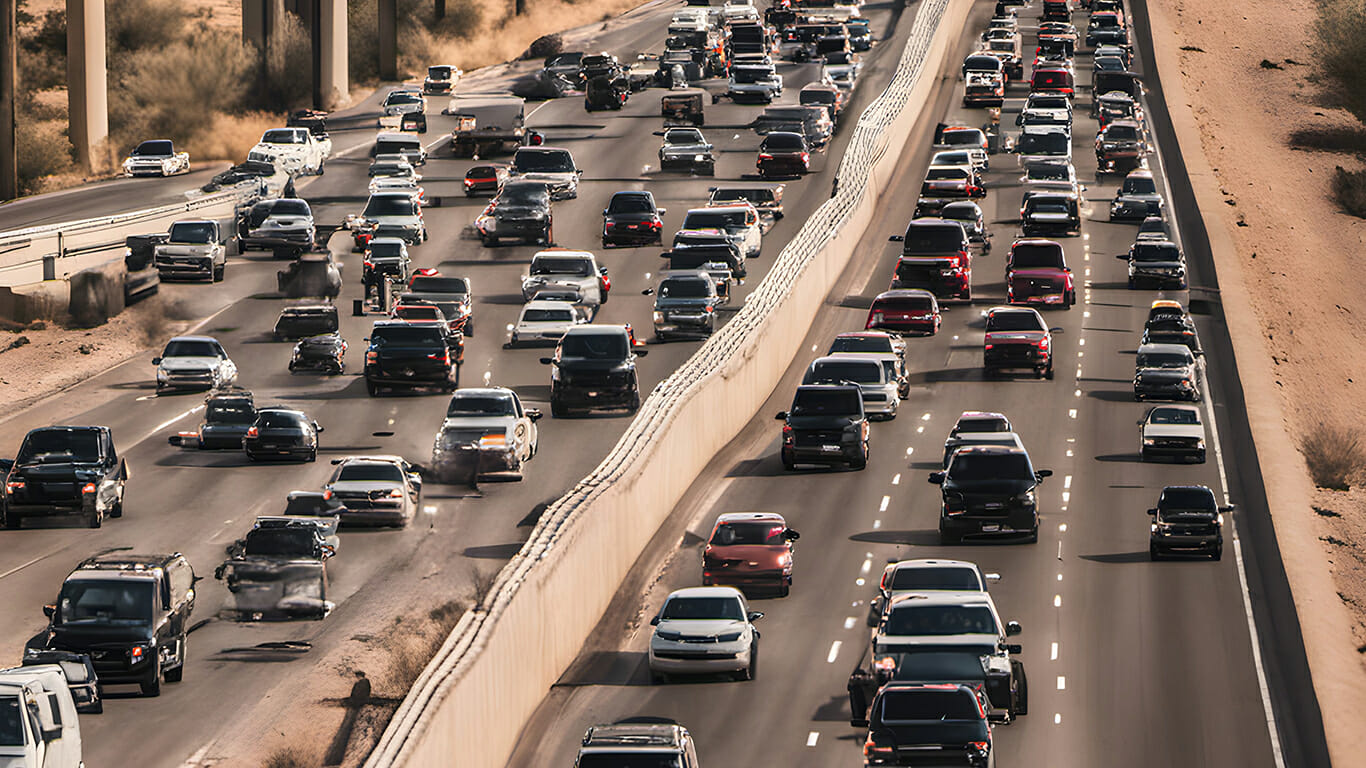Traffic safety continues to be a complicated issue in Arizona. With streets full of cars, it can be difficult for pedestrians and cyclists to navigate safely.
Traffic fatalities have been on the rise. A report from the Arizona Department of Transportation noted 1,294 traffic fatalities in 2022, an 8.6% increase from 2021. The report also indicated 302 pedestrian and 48 cyclist deaths – both up from the prior year.
LEARN MORE: 44,080 business deals take place each morning on I-10 in Phoenix
In Phoenix, which had the most traffic deaths in the ADOT report, at 301, the city in 2022 enacted the Vision Zero Road Safety Action Plan. Vision Zero is a nationwide effort that looks to eliminate traffic fatalities. Phoenix’s plan includes the “4E approach” to make roads safer for all, which includes evaluation, engineering, enforcement and education.
The city’s plan utilizes a High Injury Network, which maps corridors and intersections around Phoenix where there are a high number of motor vehicle crashes that result in injury or death.
The city’s HIN indicated 5,473 crashes happened from 2016-2020. The report established a correlation between these crashes and underserved communities impacted by lower income and less vehicle access.
The Vision Zero Community Advisory Committee advises on the city plan, looking to provide solutions to traffic safety concerns.
Ed Hermes, who serves on the Vision Zero committee, wants to focus on traffic mitigation within neighborhoods. He said that this has proven difficult in low-income communities, where traffic fatalities are generally higher.
“To make changes, the problem is so much more than just looking at a handful of intersections that are statistically very unsafe and deadly. We certainly need to do that, but we also need to look more comprehensively at policies throughout the city,” Hermes said.
He said traffic dangers have been a problem in Phoenix for years. The city council decided not to form a committee in 2019, but Hermes said there was a push from Phoenix Mayor Kate Gallego a few years later to make it happen.
“There has been a significant uptick in car and traffic violence in the last decade especially,” said Hermes, who noted the rise in deaths is a serious issue.
A committee meeting took place Feb. 15 to address different plans to combat this growing trend. Street Transportation Department staffers Sasha Perez and Gregg Bach presented an awareness campaign to the committee.
The campaign would distribute free road signs and flyers around communities to encourage safer driving. The committee saw sample signs in a presentation.
The budget would be $30,000 through the Roadway Safety Action Plan, which is a part of the city’s Transportation 2050 initiative. It would have a one-year pilot program of about 2,500 signs, with the earliest distribution of a few hundred signs in March.
Perez said that another means of community engagement happened with Phoenix schools.
“Something we found really helpful over the past year is partnering with our school districts,” Perez said. “So, this year, we distributed over 2,500 pedestrian safety activity books to schools in Phoenix. So, we’d like to partner again with those schools and distribute whichever sign sample we use.”
While the committee saw the importance of spreading awareness, members emphasized ease of visibility for the signage.
Jay Beeber, another committee member, wants to determine the campaign’s effectiveness by engaging with the community.
“One way to measure it maybe is some sort of polling or something asking people if they saw it: What impression did it have on them?” said Beeber, who suggested that a public meeting might be an effective way to gauge response.
“Our overall goal is to reduce fatalities,” Bach said when addressing concerns about the signage.
Another segment of the meeting focused on the Safe Streets and Roads for All Grant Program (SS4A), which uses U.S. Department of Transportation funds.
“The purpose of the SS4A grant is to improve roadway safety by significantly reducing or eliminating roadway fatalities and serious injuries,” said Carl Langford, a member of the street transportation project team.
In 2023, the program received a $25 million grant for the ReVISIONing Indian School Road project. The project will focus on the Indian School Road corridor between 91st and 39th avenues. Safety implementations include adding sidewalks, pedestrian crossing improvements and additional lighting.
Hermes said multiple initiatives are needed to reduce fatalities.
“Red-light enforcement is a piece of that, meaning we have a huge amount of red-light running, which leads to a lot of traffic deaths. Other pieces are design changes,” said Hermes, who suggested that one solution could be pedestrian-leading intervals, which allow pedestrians to enter an intersection before lights change.
“We’ve seen a lot of success nationally in pedestrian-leading intervals, which allow pedestrians the opportunity to cross safely,” Hermes said, noting other design changes could help, such as reducing lane widths, which “can make it safer for pedestrians as well as drivers to reduce traffic speeds.”
Hermes said that while the committee is still relatively new, its formation signifies a good start to look at issues and prioritize safety. He thinks there is a conflict with roadway construction that prioritizes traffic flow first, and that there needs to be more work done this year.
Hermes encourages people to engage in their communities to see positive results.
“Get involved in your neighborhood association. There are ways to get speed humps put in, roundabouts put in, new sidewalks put in. It’s not an easy process. It’s something that I’m working on making easier. But it’s still doable, still possible to reshape your neighborhood streets, or even your major streets, to make them safer,” Hermes said.




